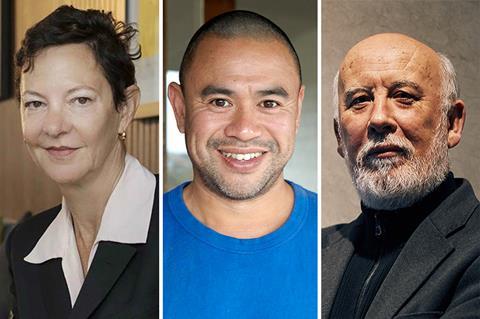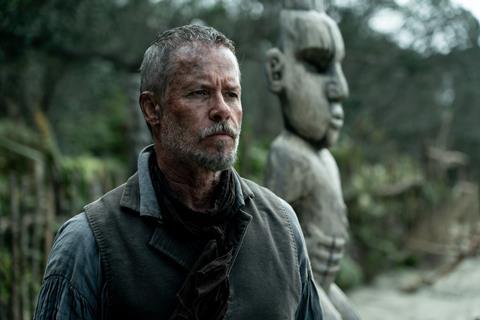UK‑Australia joint venture Brouhaha Entertainment is making some noise, announcing new projects ahead of Berlin.

It has been a prolific year for Brouhaha Entertainment. The London and Sydney-based production outfit has made five features and one TV series, and the team is attending the Berlinale with two dramas in the works, both with A-list cast attached and already garnering attention. So have they slept in the past 12 months? “It has been pretty insane,” says company co-founder Gabrielle Tana, with a laugh.
The self-styled “lean and mean team” was set up by UK-based Tana — who started her career at London’s The Gate cinema before going on to produce the likes of Philomena, The Invisible Woman and The Dig — alongside Australian Troy Lum, the founder of distributor Hopscotch Features, and his fellow Hopscotch partner/producer and The Matrix executive producer Andrew Mason.
Tana and Lum hit it off after Hopscotch distributed The Invisible Woman and Philomena in Australia. They started to partner up when Lum branched out into producing, five years ago. The joint venture of Brouhaha was officially born in the summer of 2021 with backing from the Calculus Creative Content EIS fund, launched by the British Film Institute in 2019 to support the growth of independent production companies.
The outfit does not plan to carry on producing at such a pace — which Lum put down to a “bottle-necking” of projects since the pandemic eased — but is aiming to stick to two or three features or series a year.
There is no fixed recipe for a Brouhaha project. Titles have ranged from Brazilian Karim Aïnouz’s English-language debut Firebrand, a bloody psychological horror set in the Tudor court that is in post-production, to 1980s coming-of-age series Boy Swallows Universe, set in a working-class Australian neighbourhood, which is set for release on Netflix this year.

There is also The Convert, an action feature co-produced with Auckland-based Jump Film and Television and headlined by Guy Pearce, about a lay preacher who arrives at a British settlement in 1830s New Zealand and is caught between warring Maori tribes. UK outfit Mister Smith Entertainment represents sales, with the companies eyeing an autumn premiere.
Other upcoming features include a drama about influential US writer and activist Susan Sontag, starring Kristen Stewart, plus Anton Corbijn’s Switzerland, starring Helen Mirren as author Patricia Highsmith, for which FilmNation is launching sales at the European Film Market.
There are also more TV series on simmer. In development is Love And Virtue, based on a novel by Australian author Diana Reid, with Kate Dennis attached as director. And it has optioned two more Australian books — The Weekend by Charlotte Wood, which is being adapted for the UK, and Craig Silvey’s Honeybee.
“We are shifting a lot of our emphasis to the television side,” says Lum. “Not neglecting what we are doing in independent film, that’s our heartbeat, but some of the stories we want to tell just naturally fit a longer format.”
Being spread across two continents has allowed the independent outfit to tap into the best of both nations. “The UK has fantastic writing and directorial talent,” says Lum. “One of the things the pandemic did was make a lot of the Australian talent go back and want to work in Australia. We have had the streamers enter the marketplace and there’s very serious talk about the government bringing in a quota system for local content. It feels vibrant and like a new way of doing things.”
Growing team
In addition to the founders, the team consists of four other staff members working across development and post-production. Producer Carolyn Marks Blackwood also teams up regularly with Brouhaha. There are plans to make additional hires, but none to expand into sales or distribution. “We don’t have the time, sales are not our speciality and there are great people already doing that,” says Lum.
The producers have had positive experiences of working with Netflix but agree that financial incentives should be available for turning around a hit. “[Streaming] is keeping things alive, but there does need to be some recalibration,” says Tana. “Now there are more platforms, that will probably make a difference. Netflix was the only one — with more competition it will be interesting to see how it plays out. If a title performs well, it should be rewarded.”
Financing, unsurprisingly, remains the biggest headache. “It is always like reinventing the wheel,” says Tana. Both Switzerland and the Sontag project are yet to finalise funding.
“If you think too hard about how it’s going to be done, then you work yourself into a corner of impossibility,” asserts Lum. “Every project, at some point, feels impossible. The real art of producing is making the impossible, possible. That is pretty much what we do.”















![[L-R]: Amanda Villavieja, Laia Casanovas, Yasmina Praderas](https://d1nslcd7m2225b.cloudfront.net/Pictures/274x183/6/4/1/1471641_pxl_20251224_103354743_618426_crop.jpg)








![[L-R]: Amanda Villavieja, Laia Casanovas, Yasmina Praderas](https://d1nslcd7m2225b.cloudfront.net/Pictures/100x67/6/4/1/1471641_pxl_20251224_103354743_618426_crop.jpg)
No comments yet